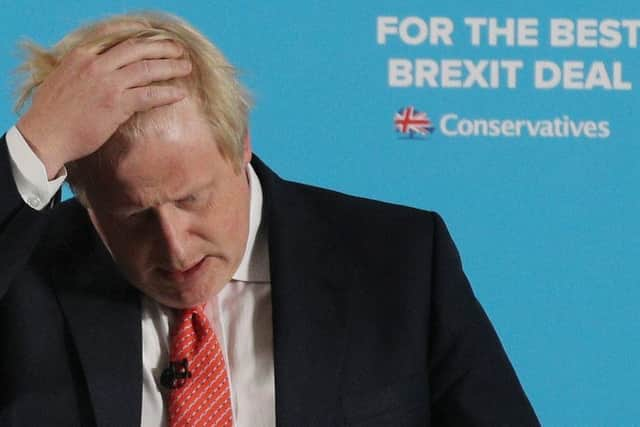Chris Burn: Bitter Brexit irony for Boris Johnson as UK loses control
“They say we can’t do it, we say we can,” he implored to rapturous applause. “They say we have no choice but to bow down to Brussels, we say they are woefully underestimating this country and what it can do. If we vote Leave and take back control I believe that this Thursday can be our country’s independence day.”
Two days later, British voters shocked the world by delivering exactly what his rallying cry had asked for.
Advertisement
Hide AdAdvertisement
Hide AdIt has been a long and bruising two-and-a-half years since then. On Tuesday evening, as news emerged that negotiators had reached technical agreement on the terms of Britain’s departure from the EU, Mr Johnson lamented how things have transpired under the leadership of Theresa May. “We are going to stay in the Customs Union, we are going to stay in large parts of the Single Market, that means it is vassal state stuff,” he lamented.


“For the first time in 1,000 years, this Parliament will not have a say over the laws that govern this country.”
It was an admission of a bitter irony for those like Johnson who fought so hard for Leave; a campaign based on a central premise of “taking back control” and increasing this country’s sovereignty is now on course to significantly diminish it.
The verbose former Foreign Secretary is no stranger to literary allusions and he described Brussels and Downing Street finally announcing they had reached agreement as a “Chronicle of a Death Foretold” – a reference to a Gabriel García Márquez novel about a murder that was warned of in advance but no one stopped.
Advertisement
Hide AdAdvertisement
Hide AdIt was a comment on the agreement being largely based on the Prime Minister’s Chequers plan, but the reality is such a description could easily apply to the Leave campaign itself. On the same Wembley Arena stage as Boris Johnson, his Conservative colleague Ruth Davidson warned of exactly the scenario that is now playing out. “I don’t think you take control by leaving the EU, I think you lose control by losing your seat at the table,” she said.
Of course, sovereignty was far from the only issue that the referendum was fought on and it is worth examining how the other central claims of the Vote Leave campaign have now transpired.
Along with ‘‘Take Back Control’’, perhaps the most memorable and disputed claim was that leaving the EU would save the country £350m a week – money it was suggested could be directed towards putting the NHS in a healthier position. Leaving aside the arguments over the UK’s budget rebate and whether the economic benefits of EU membership outweighed Britain’s contribution, what is not in dispute is that the British Medical Association now believes Brexit and its likely impact on issues such as recruiting skilled staff and collaborating on medical research “poses a major threat to the NHS and the nation’s health”, with a no deal outcome having “potentially catastrophic consequences for patients, the health workforce and services”. Research from the Nuffield Trust published this week suggested a ‘‘no deal’’ departure would cost the NHS £2.3bn by 2020 through increased prices for supplies such as medicines, bedding and X-ray machines.
The other core argument of Vote Leave was that departing the EU would allow the UK to control its borders and cut immigration. In this area, even before Theresa May’s commitment to end free movement has come into place, there has been some success – but not without consequence. In the past year, the number of EU nationals working in the UK fell by 132,000 to 2.25 million in the largest annual drop since records began in 1997 – but the number of unfilled vacancies has also hit a record high of 845,000.
Advertisement
Hide AdAdvertisement
Hide AdThose who consider this a price worth paying to cut immigration may want to reflect on the attitude of nations that Britain hopes to sign future trade deals with. India’s High Commissioner to the UK said last year Britain would need to accept higher levels of immigration from his country as part of any deal; a demand they will not be alone in making.
Mrs May’s Brexit deal may never become a reality and Mr Johnson has suggested, somewhat hopefully, that “we still have time to go for something better”. But, as things stand, and as the nation heads towards a position of having to accept rules and regulations from Brussels with no say over them, another literary allusion springs to mind when it comes to his past claims on sovereignty – The Boy Who Cried Wolf.